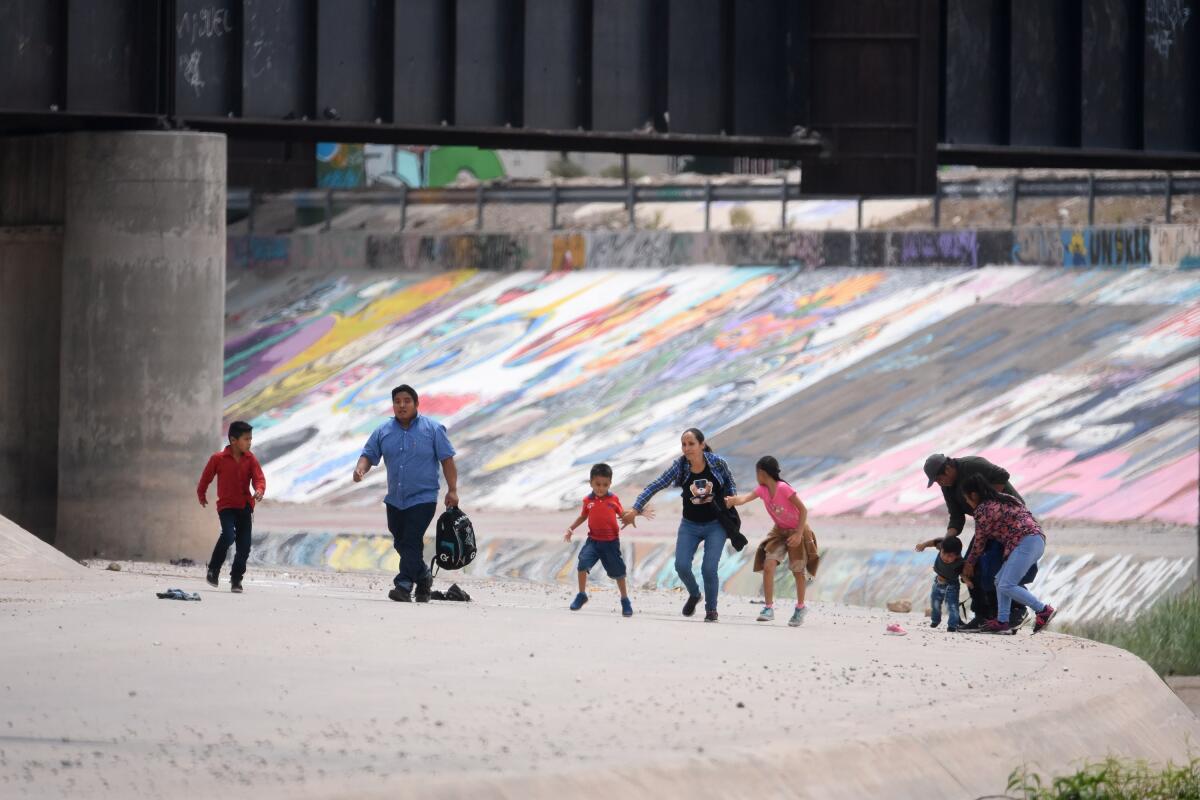Migrants say El Paso shooting won’t deter them from seeking new lives in the U.S.

CIUDAD JUAREZ, Mexico — The massacre at an El Paso Walmart store on Saturday hasn’t diminished Silvia Ivania’s desire to move to the United States — even if the killer of 22 people was apparently motivated by hatred of Latino immigrants.
“That’s something that can happen anywhere,” said Ivania, 37, a citizen of Honduras, speaking at the Good Samaritan migrant shelter in this border city across the Rio Grande from El Paso. “The violence in Honduras is a lot worse than in the United States.”
She and several other migrants interviewed Tuesday at the shelter — temporary home to about 100, mostly Central Americans, but including U.S.-bound Cubans, Africans and others — agreed that the mass killing would not dissuade them.
“If anything, I want to go to the United States even more than before,” said Danieska Del Toro, 34, from Havana. “They arrested the guy, right? Maybe he was crazy. In Cuba we have violence too, even if the regime says there is none.”
Along the nearby Rio Grande, which separates the U.S. and Mexico, scattered groups of migrants could be seen Tuesday scampering across the river — which, at the moment, has been reduced to a few scattered puddles amid a narrow ribbon of green, and easy to traverse on foot. Its shallow depths seem to mock signs warning people of the danger of drowning.
At midday, amid 100-degree-plus temperatures, about 20 people — some holding their children’s hands — surrendered to U.S. Border Patrol vans waiting on the other side. As is usually the case, the migrants didn’t attempt to evade U.S. immigration authorities, but sought them out.
Mexican National Guard troops posted on the south side said they urged border crossers not to proceed, but didn’t prevent their passage.
“That’s their decision; we just tell them of the risks,” said one Mexican National Guard officer, who declined to be named because she wasn’t authorized to speak publicly.
Arrests along the U.S.-Mexico border are down about 40% since Mexico began a crackdown on migrants in early June, authorities say. Mexican officials have stepped up detentions and deportations of Central Americans and other northbound migrants.
But many are still making their way to the border, and thousands are stranded in Juarez and other northern border towns. Many, like Ivania and Del Toro, are waiting for the adjudication of political asylum petitions filed when they were detained on the U.S. side. Others are waiting their turns to file asylum applications.
Ivania said she and her husband — a former Honduran soldier — and two daughters, aged 9 and 7, entered southern Mexico in April and waited there for more than two months to receive humanitarian visas from the Mexican government. In southern Mexico, too, the family lived in a shelter, she said.
The humanitarian visas allowed the family to traverse Mexico legally. They took public buses to Juarez, crossed the border illegally into El Paso on July 4 and surrendered to the U.S. Border Patrol. Their journey followed the footsteps of tens of thousands of migrants in recent months.
After a one-day detention, Ivania and her family were returned to Mexico to await a court hearing in El Paso on their asylum case under the Trump administration’s so-called Remain in Mexico policy.
“At least our date is finally coming up,” said Ivania, noting that the family has an appointment Aug. 20 at the U.S. border crossing in El Paso for a hearing on their asylum case.
But their wait could drag on beyond Aug. 20. Some asylum applicants have been sent back again to Mexico after initial hearings to wait for further court sessions.
To Ivania, the fact that El Paso was the site of a mass shooting apparently targeting Latinos is mostly irrelevant. If allowed to enter the United States, she said her family planned to move in with relatives in Texas.
“All countries have crime,” said Ivania, seated inside the migrant shelter in a small chapel, now filled with mattresses, backpacks and sleeping children. “What happened is out of the ordinary and terrible for the victims. But for my family the United States represents an opportunity that we don’t have in Honduras.”
More to Read
Sign up for Essential California
The most important California stories and recommendations in your inbox every morning.
You may occasionally receive promotional content from the Los Angeles Times.










